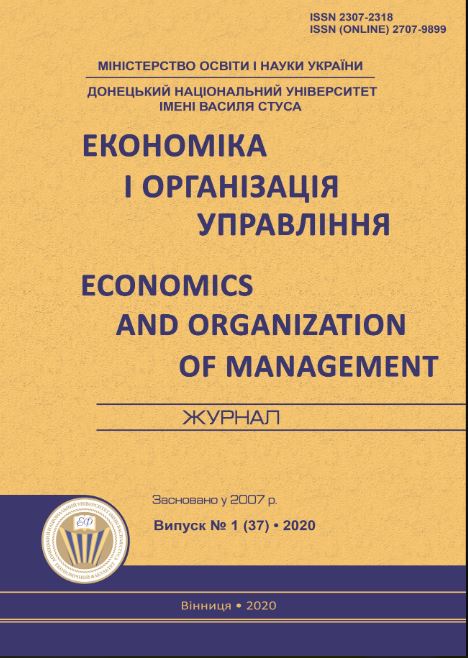Evaluation of the European Union countries energy reliability.
DOI:
https://doi.org/10.31558/2307-2318.2020.1.3Keywords:
European Union, energy security of the country, assessment of energy reliability, energy security indices of the countryAbstract
The article deals with discussing scientific, practical and methodological approaches to determining the assessment of countries' energy security and reliability, regardless of whether they have their own energy resources or importing it. To ensure their own economic and energy security, each state must constantly implement legal, economic and administrative measures aimed at protecting its national interests, while relying on a long-term strategy.
It’s worth noting the fact that the definition of the category "energy security" should contain technological and economic components, combined in some way. That is, in the modern sense, the energy security guarantee is the achievement of a technically reliable, stable, costeffective and environmentally balanced provision of energy resources to the needs of the economy and the population, as well as the creation of conditions for the formation and implementation of a policy to protect national interests in the energy sector.
The article discusses indicators that contribute to the growth of economic stability of energy enterprises and, consequently, countries' energy security. With the help of these indicators, the capabilities of the selected outsourcers are compared, and also analyzes the feasibility of a contract form or the feasibility of creating a separate enterprise, on the basis of which the existing divisions for the production of energy products of diversified production, will ensure the country's energy security. The article emphasizes 3 countries with the highest level of energy security – the UK, Russia and Belgium. Russia due to natural resources, Great Britain and Belgium due to internal economic potential. The European Union is forced to import almost all energy resources and ensuring energy security has become a critical issue on the European Union agenda. The EU has the largest energy supplies among the regions of the world, approximately 15% of the entire world market. At the same time, the gap between production and consumption of solid fuel is very large, more than in the United States. The main supplier of Europe is Russia, which to some extent puts European countries in a dependent position. Therefore, an important area of European policy is the energy supplies diversification and ensuring the country's energy security. From the point of view of determining the future role of energy carriers in the European countries energy supply, it is important to evaluate the main factors that determined considered in the article trends in world energy consumption. It is worth noting that almost every energy carrier has a technological niche, where its use is predominant or even exclusive. Therefore, it is very important for the countries of the European Union to achieve the highest level of energy security and independence.
References
Борисов В. Н. Микроэкономика: В 5-х т. / Общ. ред. Чеплянского Ю. В. — СПб.: Экономическая школа, 2015. — Т. 7, с. 1168—1169, 1171.
Бродский В. А. Сравнение двух методов определения границ товарных рынков: тест гипотетического монополиста и метода попарного сопоставления // Современная конкуренция. 2013. № 5 (41). C. 4-17.
Hellmer S., Wárell L. On the evaluation of market power and market dominance — The Nordic electricity market // Energy Policy. 2009. Vol. 37. P. 3235-3241.
Melnik A., Shy O., Stenbacka R. Assessing market dominance // Journal of Economic Behavior & Organization. 2008. Vol. 68. P. 63-72.
Астахов А.С, Диколенко Е.Я, Харченко В.А. Экологическая безопасность и эффективность природопользования. Горная книга, изд-во МГГУ.-2009.- 323с.
Воспроизводство шахтного фонда и инвестиционные процессы в угольной промышленности Украины / Г.Г. Пивняк, А.И. Амоша, Ю.П. Ященко и др. – К.: Наук. думка, 2004. – 331 с.
Принципи екологічної паспортизації вуглевидобувних підприємств України в умовах реструктуризації галузі [Текст] : монографія / А. В. Бардась; Нац. гірн. ун-т, Ін-т економіки пром-сті НАН України. - Д.: НГУ, 2010. - 399 с.: рис., табл. - Бібліогр.: с. 364-397.
Козаченко А.В. Экономическая безопасность предприятия: сущность и механизмы обеспечения: Монографія / А.В. Козаченко, В.П. Пономарев, А.Н. Ляшенко. – К.: Либра, 2003. – 280 с.
Райхель Б.Л., Павленко И.И. Объекты инвестиций и возможные источники их финансирования в угольной отрасли // Проблемы развития внешнеэкономических связей и привлечения иностранных инвестиций: региональный аспект. – Донецк: ДонНУ, 2006. – Ч.3. – С. 1175-1179.
Трифонова О. В. Управління стійким функціонуванням вугледобувних підприємств: теорія та практика: монографія / О.В. Трифонова ; М-во освіти і науки України ; Нац. гірн. ун-т. – Дніпропетровськ : НГУ, 2015. – 330 с.
Дж. Брайан Хейвуд. Аутсорсинг: в поисках конкурентных преимуществ = Outsourcing Dilemma, The: The Search for Competitiveness. — М.: «Вильямс», 2004. — С. 176.
Бравар Ж-Л, Морган Р. Эффективный аутсорсинг. Понимание, планирование и использование успешных аутсорсинговых отношений. — М.: Баланс Бизнес Букс, 2007.

